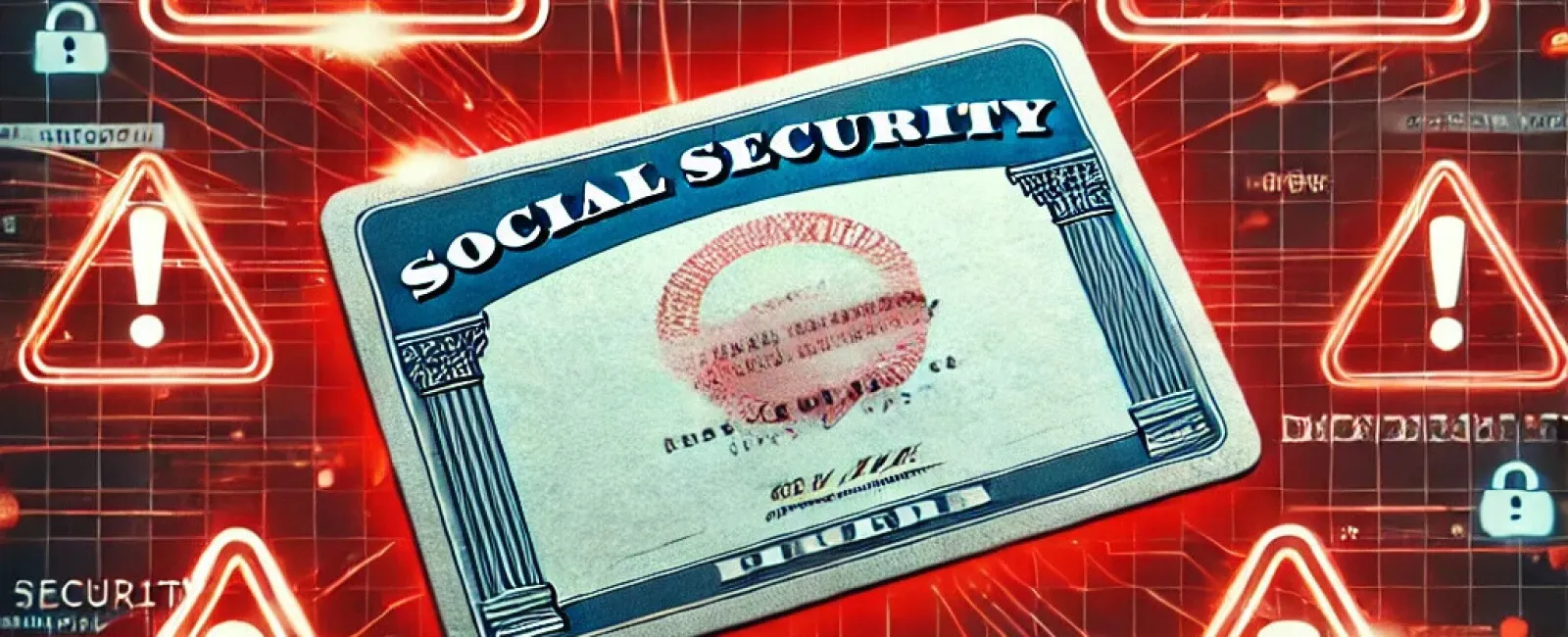December 23, 2024
By now, many Social Security numbers (SSNs), one of the most crucial pieces of personal data, have likely ended up on the dark web. This is largely due to security breaches at major corporations, government websites, and healthcare providers, resulting in millions of SSNs circulating among cybercriminals. While this is concerning, one might wonder if it's truly a significant issue.
The answer is a resounding yes, and here's why a compromised SSN can disrupt your life, how to determine if yours has been leaked, and what steps to take if it has.
Is a Leaked Social Security Number Really That Serious?
In the U.S., your Social Security number is a vital component of your identity. With access to your SSN, a hacker can unlock a wealth of financial and personal information, potentially impersonating you, taking out loans, and accessing sensitive accounts. Even if the effects aren't immediate, criminals can hold onto SSNs for years, waiting for the perfect opportunity to exploit them.
Potential Consequences of Someone Having Your Social Security Number
If your SSN falls into the wrong hands, it can lead to:
- Identity Theft: Criminals can open credit accounts, secure loans, or file false tax returns using your SSN.
- Employment Fraud: Someone might use your SSN to get a job, leading to unexpected tax problems for you.
- Medical Fraud: Some criminals use stolen SSNs to obtain healthcare, leaving you with inaccurate medical records that can complicate future care.
Consider the Equifax data breach of 2017, which exposed the SSNs and personal information of 147 million people. Many victims faced issues like fraudulent credit card applications and false tax returns, with some still dealing with the aftermath. The Equifax breach underscores the seriousness of SSN exposure and its real-world implications.
Signs Your Social Security Number May Be Stolen
Concerned that your SSN might be misused? Watch for these warning signs:
- Unexpected Mail: Receiving credit card offers, debt collection notices, or bills for accounts you didn't open.
- Credit Report Surprises: Discovering unrecognized accounts or inquiries from unknown sources on your credit report.
- Tax Return Issues: The IRS informs you of multiple tax returns filed under your name, or you're denied an expected refund.
- Healthcare Records: Spotting unfamiliar medical bills or unusual entries in your medical records.
How to Check If Your SSN Was Leaked and Protect It
Whether you've noticed these warning signs or just want to be cautious, here are steps to check and safeguard your SSN:
- Monitor Your Credit Report: Regularly review your credit report for unfamiliar accounts. You're entitled to a free credit report annually from each major credit bureau (Experian, TransUnion, and Equifax). Make it a habit to look for unusual activity.
- Use an Identity Theft Protection Service: Services like Experian IdentityWorks or LifeLock can monitor your SSN and alert you to suspicious activity. While they can't prevent identity theft, they can help you detect and address issues more quickly.
- Freeze Your Credit: Freezing your credit is a highly effective way to prevent fraud. It restricts access to your credit report, making it much harder for anyone to open accounts in your name. You can freeze and unfreeze your credit for free with each of the three major credit bureaus.
- Sign Up for SSN Alerts: The Social Security Administration offers alerts for specific activities, like changes to your Social Security account. While not comprehensive, it's an extra layer of awareness to help catch fraud early.
Immediate Actions if Your SSN Is Compromised
If you confirm your SSN is compromised, take these immediate steps:
- File a Report with the FTC: Visit IdentityTheft.gov to file a report with the Federal Trade Commission. The site will guide you through a recovery plan tailored to your situation.
- Contact the Credit Bureaus: Inform Experian, Equifax, and TransUnion that your SSN has been compromised. Place a fraud alert on your credit report to ensure lenders verify your identity before issuing credit.
- Freeze Your Credit: If you haven't already, place a freeze on your credit report to prevent new accounts from being opened in your name.
- File a Police Report: If identity theft has led to financial loss or involves criminal activity, consider filing a report with your local police department. This can provide useful documentation for resolving issues with creditors.
- Notify Financial Institutions: Contact your bank and other financial institutions to inform them of your compromised SSN. They can place alerts on your accounts and monitor for suspicious activity.
Protecting Your Business: The Importance of Cybersecurity
For small and medium-sized businesses, safeguarding Social Security numbers and other personal information is crucial. A compromised SSN can lead to identity theft for employees and clients, unauthorized access to financial accounts, and potential data breaches. Businesses often store sensitive employee and client information, so an SSN leak can expose both individuals and the business to legal, financial, and reputational risks.
Implementing a robust cybersecurity plan, including data encryption, network security, and employee education, is the best way to protect sensitive information and prevent data breaches.
If you need help securing your business against data breaches and identity theft, our cybersecurity team is here to support you. Click here or give us a call at 630-895-8208 to schedule a FREE Discovery Call and safeguard your business from costly cyberthreats.





